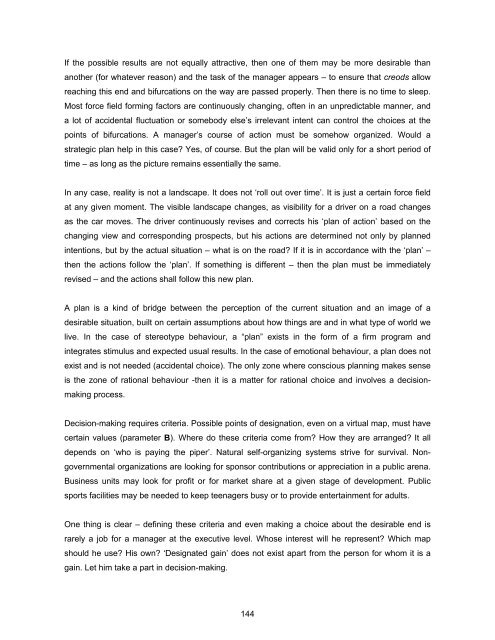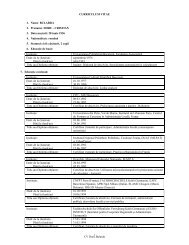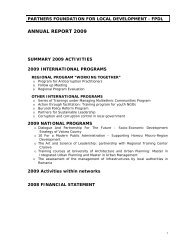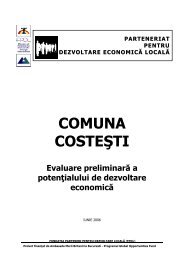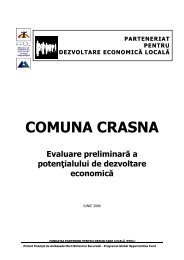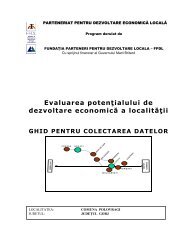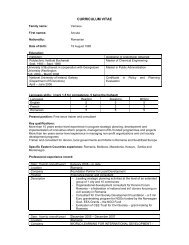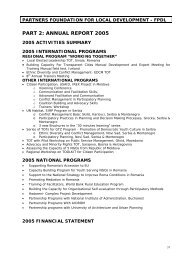Organizational Development: A Manual for Managers and ... - FPDL
Organizational Development: A Manual for Managers and ... - FPDL
Organizational Development: A Manual for Managers and ... - FPDL
You also want an ePaper? Increase the reach of your titles
YUMPU automatically turns print PDFs into web optimized ePapers that Google loves.
If the possible results are not equally attractive, then one of them may be more desirable than<br />
another (<strong>for</strong> whatever reason) <strong>and</strong> the task of the manager appears – to ensure that creods allow<br />
reaching this end <strong>and</strong> bifurcations on the way are passed properly. Then there is no time to sleep.<br />
Most <strong>for</strong>ce field <strong>for</strong>ming factors are continuously changing, often in an unpredictable manner, <strong>and</strong><br />
a lot of accidental fluctuation or somebody else’s irrelevant intent can control the choices at the<br />
points of bifurcations. A manager’s course of action must be somehow organized. Would a<br />
strategic plan help in this case? Yes, of course. But the plan will be valid only <strong>for</strong> a short period of<br />
time – as long as the picture remains essentially the same.<br />
In any case, reality is not a l<strong>and</strong>scape. It does not ‘roll out over time’. It is just a certain <strong>for</strong>ce field<br />
at any given moment. The visible l<strong>and</strong>scape changes, as visibility <strong>for</strong> a driver on a road changes<br />
as the car moves. The driver continuously revises <strong>and</strong> corrects his ‘plan of action’ based on the<br />
changing view <strong>and</strong> corresponding prospects, but his actions are determined not only by planned<br />
intentions, but by the actual situation – what is on the road? If it is in accordance with the ‘plan’ –<br />
then the actions follow the ‘plan’. If something is different – then the plan must be immediately<br />
revised – <strong>and</strong> the actions shall follow this new plan.<br />
A plan is a kind of bridge between the perception of the current situation <strong>and</strong> an image of a<br />
desirable situation, built on certain assumptions about how things are <strong>and</strong> in what type of world we<br />
live. In the case of stereotype behaviour, a “plan” exists in the <strong>for</strong>m of a firm program <strong>and</strong><br />
integrates stimulus <strong>and</strong> expected usual results. In the case of emotional behaviour, a plan does not<br />
exist <strong>and</strong> is not needed (accidental choice). The only zone where conscious planning makes sense<br />
is the zone of rational behaviour -then it is a matter <strong>for</strong> rational choice <strong>and</strong> involves a decisionmaking<br />
process.<br />
Decision-making requires criteria. Possible points of designation, even on a virtual map, must have<br />
certain values (parameter B). Where do these criteria come from? How they are arranged? It all<br />
depends on ‘who is paying the piper’. Natural self-organizing systems strive <strong>for</strong> survival. Nongovernmental<br />
organizations are looking <strong>for</strong> sponsor contributions or appreciation in a public arena.<br />
Business units may look <strong>for</strong> profit or <strong>for</strong> market share at a given stage of development. Public<br />
sports facilities may be needed to keep teenagers busy or to provide entertainment <strong>for</strong> adults.<br />
One thing is clear – defining these criteria <strong>and</strong> even making a choice about the desirable end is<br />
rarely a job <strong>for</strong> a manager at the executive level. Whose interest will he represent? Which map<br />
should he use? His own? ‘Designated gain’ does not exist apart from the person <strong>for</strong> whom it is a<br />
gain. Let him take a part in decision-making.<br />
144


